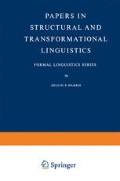Abstract
In this first major publication to result from his years in India, Emeneau shows how valuable it is for linguists to obtain the thorough and unhurried acquaintance with a language community which these years in India gave him. Emeneau publishes here eleven myths and tales in phonemic tran-scription, with translation and brief notes (38–191). This is preceded by a sketch of Kota grammar (15–29) and a short text with detailed linguistic analysis (30–5).
Access this chapter
Tax calculation will be finalised at checkout
Purchases are for personal use only
Preview
Unable to display preview. Download preview PDF.
Notes
Here, as in the other cases below, the alternative analyses are given only for their own sake and as examples of possible methods of analysis. They are in no way presumed to correct or amplify Emeneau’s interpretation.
Identical in phonetic form, but not in extent, with the phonetic value of the word juncture.
Replacement of ay by i· is due to another rule.
This includes the transitive suffix, whose chief form is č, and the mediacy suffix, whose chief form is kč. Since the two apparently do not occur together, and since the transitive meaning is implicit in the mediacy suffix, the latter could be broken into two:-k-‘mediacy’,-č-transitive. This partition, however, would have the drawback of yielding a morpheme which is limited to occur only with the transitive.
X represents whatever follows the \(C\overset{\lower0.5em\hbox{$\smash{\scriptscriptstyle\smile}$}}{\bar V}\) of the preceding noun stem: pǔj ‘tiger’, pǔj gǐj ‘tigers and the like’. The ‘and’ is not part of the meaning of ǧiX, since it occurs in all cases of the construction N 1 N 2 = N, as in im a·v ‘buffaloes and cows’.
Equivalently, we may say that the pre-oblique case form is a variant of the other.
Emeneau has already done this in part in the equations S2-ụl = S1, etc., in § 59.
If we do not wish to regard the absolute case as a zero suffix, but prefer to say that when there is no suffix it is merely the noun stem by itself that occurs (in absolute meaning), we would have to replace this equation by nc = n, indicating that a noun stem without case ending occurs in the same environments as a noun stem with case ending.
There are restrictions on the concurrence of E 3,4 and members of m. Some tense-modal suffixes occur with E 3, others with E 4. The indicative present-future occurs with either one.
Each ends in one of these three. If they were grouped into one class, marked, say, by z, we could say that each utterance is of the form N, Nz or NVz and so on. This is an added reason for distinguishing them from /,/ as was done above.
References
M. B. Emeneau: Kota Texts: Part One (University of California Publications in Linguistics, Vol. 2, No. 1), University of California Press, Berkeley — Los Angeles, 1944.
Author information
Authors and Affiliations
Rights and permissions
Copyright information
© 1970 Springer Science+Business Media Dordrecht
About this chapter
Cite this chapter
Harris, Z.S. (1970). Emeneau’s Kota Texts. In: Papers in Structural and Transformational Linguistics. Formal Linguistics Series. Springer, Dordrecht. https://doi.org/10.1007/978-94-017-6059-1_13
Download citation
DOI: https://doi.org/10.1007/978-94-017-6059-1_13
Publisher Name: Springer, Dordrecht
Print ISBN: 978-94-017-5716-4
Online ISBN: 978-94-017-6059-1
eBook Packages: Springer Book Archive

